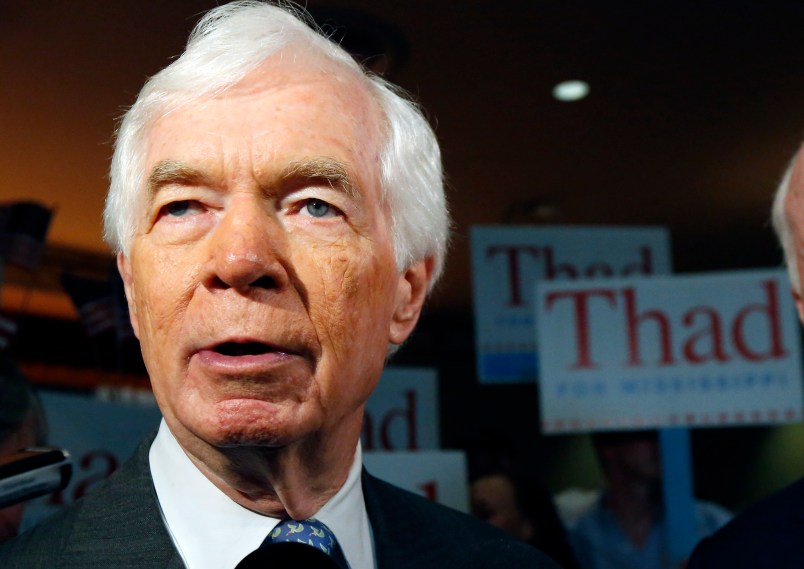As is always the case, many gallons of ink (and cyber-ink) will be spilled over the next 48 hours harvesting national political implications from Thad Cochran’s victory in the Mississippi GOP Senate runoff yesterday. Some will simply revert to the MSM’s preferred “Establishment Crushes Tea Party” 2014 primaries narrative. Others will tout Cochran as matching Mitch McConnell in pursuing the audacious tactic of aggressively reminding Republican voters of the smoky goodness of the pork they deliver.
And probably not a few observers will make it an object lesson for the GOP that African-American voters can be drawn to their side — even in a GOP primary — with the right combination of effort and message.
There could be an element of truth to all these interpretations. But it’s important to remember we are talking about Mississippi, a unique state in many respects. Let’s look at the ways the Magnolia State’s unusual character made Thad Cochran’s win possible:
1) Heavy dependence on military spending in coastal counties, where Cochran campaigned heavily during the runoff period and improved both turnout and his percentage of the vote.
2) The justifiably defeatist attitude among Mississippi Democrats that made them a ripe target for Cochran’s audacious attempts to recruit them for a Republican runoff.
3) The lack of party registration, the poor turnout in the June 3 Democratic primaries, and Mississippi’s large African-American population, which together created a pool of winnable Democratic votes for Cochran.
4) The highly visible McDaniel-associated campaign to deplore and even intimidate “crossover” voting, which brought back many bad memories of Mississippi’s notorious resistance to African-American voting rights.
5) The massive trans-ideological support for Cochran among a Mississippi “Republican Establishment” that would be considered hard-core right-wing in most other states.
These factors help explain why Team Cochran deployed the counter-intuitive runoff strategy of not competing with McDaniel for the “most conservative” mantle, but instead emphasizing his pork-producing background, attacking McDaniel as an extremist, and overtly appealing for Democratic (code in Mississippi for African-American) votes.
Is there another state where a Republican could deploy this same strategy and win? It would have to be a heavily GOP state with a sizable defense industry, no party registration, an unusually conservative “Republican Establishment” and a large percentage of minority voters. That pretty much narrows it down to Alabama and maybe Texas. Add in the fact that Cochran had managed to avoid race-baiting for a few decades in a race-obsessed state, and you have a really unique situation.
Had McDaniel won, we might have had the interesting and potentially replicable scenario of conservative voters choosing ideology over self-interest in America’s poorest state, and then a general election test of partisan and racial polarization. But that’s all water over the Tallahatchie Bridge.
Anyone who tells you yesterday’s runoff in Mississippi explains much of anything about any place other than Mississippi may be reaching. But Josh Marshall is right: the backlash to the Cochran victory in Mississippi and elsewhere could be powerful. It’s bad enough for “Establishment Republicans” to make electability arguments against “true conservatives” who view electoral victories as subordinate to maintaining a permanent agenda of turning back the clock to 1964 or even 1934. It’s far worse when Republicans resort to appeals to those people in a GOP primary, particularly on the basis of ACORN-like suggestions that those people might benefit from their votes in terms of federal largesse.
It will be interesting to see if McDaniels and his national backers resort to the threadbare “voter fraud” explanation for Cochran’s win, especially if they rely on the even more threadbare argument that Mississippi law bans primary voting by those who do not intend to support the party in November (yes, it theoretically does, but absent brain scans it’s unenforceable, and if it were enforceable it would be unconstitutional). As for Democrats: they may hoist one or two cheers for their voters deciding a GOP nomination primary, but withhold more because they probably doomed their own candidate to defeat.
Again, that’s a Mississippi exclusive.
Ed Kilgore is the principal blogger for Washington Monthly’s Political Animal blog, Managing Editor of The Democratic Strategist, and a Senior Fellow at theProgressive Policy Institute. Earlier he worked for three governors and a U.S. Senator. He can be followed on Twitter at @ed_kilgore.







So the status quo endures.
Maybe McDaniel’s staff can break in tonight and change the outcome.
Does anyone have a handle on where this might lead if Cochran wins in November?
Were promises of future action made to Democrats who voted for him on Tuesday?
Will they expect or demand that Cochran, along with other “Establishment” Mississippi Republicans, push for more pork, or pressure the state to expand Medicaid?
Or was fear of a Tea Party win enough to sway Democrats?
Hate to say it but the people of Mississippi won. I desperately want the Dems to win but barring that I can see how voters would choose unpleasant over toxic. The only consolation is that it sounds like there will be a long and protracted recount and general in-fighting in the GOP. In the end McDaniels has no where else to go but the GOP unless it’s a the 3rd party, and that’s a dead end. He may be promised something by the GOP and go away quietly.
The only outcome from this I think will be closed primaries in MS. Like with most unique artifacts of southern politics (runoffs, etc …) the reasons for the open primary system was probably about race. Came back to bite the most rabid race-haters today.
… almost forgot, Rove was heavily involved in this so is the margin of victory within striking distance of a recount reversal or real evidence of GOP criminal activity at the ballot overturning the result?